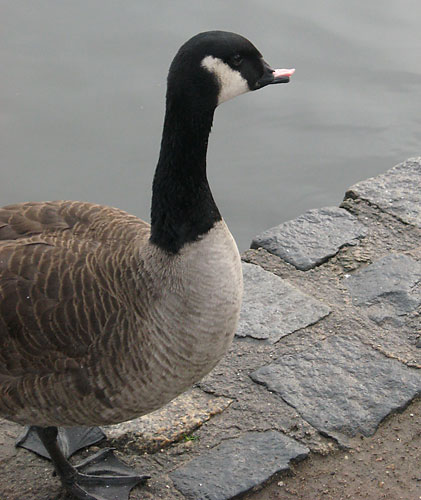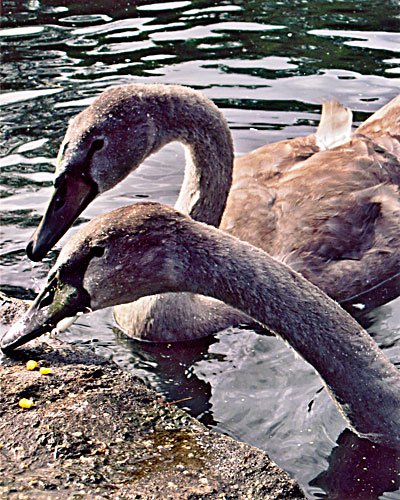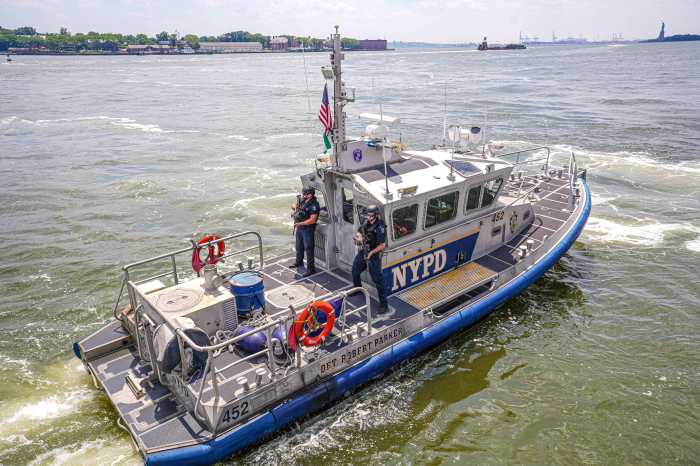Fishermen in Prospect Park have finally reeled in the Big Ones: geese!
Concerned residents say that two of the beloved waterfowl have been spotted with injuries that could only have resulted from a rendezvous with a man and a pole.
One water bird apparently swallowed a hook and line and now has the monofilament protruding from his chest, plus a torn foot. Another suffered months with a fishing hook lodged in his beak — though the hook has since been removed.
Both injuries were discovered by bird lovers Anne-Katrin Titze and her companion, Ed Bahlman, who have developed into self-styled spokesmen for the fowl.
“If the park is going to permit fishing, there has to be enforcement,” said Bahlman.
The startling dangers lurking beneath the water’s surface first alarmed Titze when she participated in a fish census in a small portion of the lake. After park workers damned and drained the lake, loads of human detritus was suddenly in plain view.
Titze, who teaches at Hunter College, pulled an assortment of toys, a skateboard, buckets, fishing line and hooks and even a rusted clamming basket — those can’t be good clams — from the small segment of the lake. All told, Titze said, she and others filled 16 trash bags with waste from the lake.
After the experience, Titze and Bahlman began to frame a prime suspect responsible for the injuries to their favorite feathered friends: Careless fishermen.
“If it’s so upsetting for us, how do these animals feel?” pleaded Bahlman.
The pair pointed to fishing line caught in trees along the lake, as well as “Beaky,” a disfigured goose with only a lower beak, as further evidence of the horrors caused by a hook (it was like “The Elephant Man,” but with a goose).

The duty to rescue any animals harmed by human hazards falls to the Urban Park Rangers — whose director admitted that problems with fishing equipment and animals are not uncommon.
But the director, Sarah Aucoin, also said such dilemmas are easy to resolve and that celebrity swans of Prospect Park are monitored closely, thanks to recent media coverage of an inter-species battle.
Indeed, she blamed the intense glare of the paparazzi for some of the problem.
“They [the birds] are becoming too familiar” because of all the coverage, she said. “It’s better for an animal to be fearful of humans. If swans come to think that all people have food, it could actually seriously hurt a kid.”
As for any solution to the problem with stray monofilament, Aucoin noted that a fishing line recycling program at Harlem Meer in Central Park had been very successful.
Others were also reluctant to criticize fishermen, who have a vested interest in conserving the fragile urban ecology.
“Most fishermen don’t leave stray monofilament behind,” said Glenn Phillips, director of the New York Audubon Society. “But all it takes is an irresponsible minority to make a big difference.”
Bahlman and Titze are hoping that officials will ramp up enforcement and education regarding proper fishing procedures, but a spokesman for the park added a dose of reality.
“The lake has more garbage than we like,” said Eugene Patron, the spokesman for the Prospect Park Alliance. “There just aren’t enough [enforcement officers] on the entire 60-acre watercourse to make sure people are doing what they should.”
So for now, if you see something, squawk something.

























